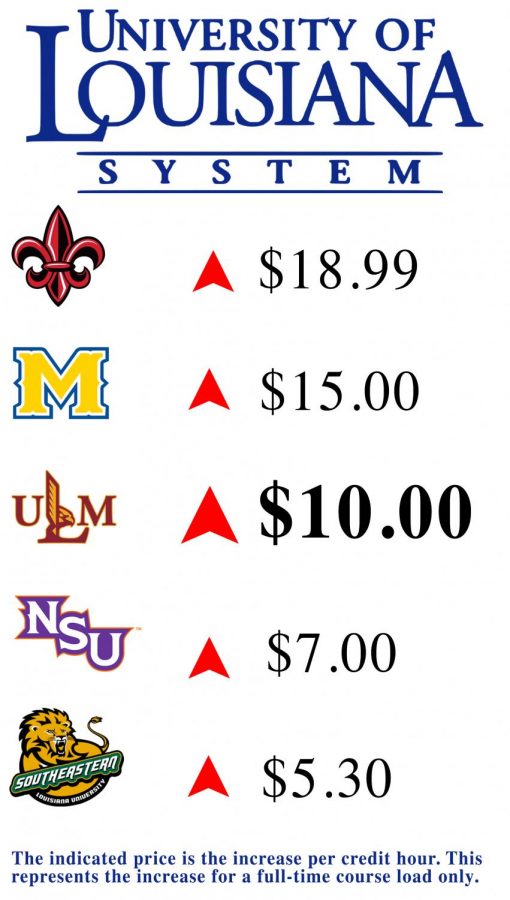New fee to take effect Spring 2019
November 4, 2018
As students sighed a breath of relief over missing out on one increased fee, new ones have risen. On Wednesday, Oct. 18, the University of Louisiana System’s governing board approved for a new fee to go into effect Spring of 2019.
At ULM, for each credit hour, an additional $10 will be charged, and for any hour over twelve, $36.85 will be charged. For example, if a student takes fifteen hours, this means that they will have to pay around $230.55 extra next semester and each semester afterward. However, it was also decided that TOPS will not cover this new fee.
This will affect students all over the state, and colleges in the system have an estimated, combined total of an additional $9 million. However, when asked about money distribution, it was said that only $500,000 of that will go toward student aid. The other $8.5 million is supposedly going towards faculty pay raises, the expansion of student services and resources, technology improvements and more course offerings. ULM alone is expected to receive an additional $607,000 per semester.
Online, the news of an increased fee has had students talking. Joey Gardunio, a senior business major wasn’t happy regarding the increase.
“They (the UL System) have shown that they don’t know how to manage their money by hiring poor professors, putting money into trendy programs that no one uses and that disappear in a few years and replacing flowers every month, when most students can’t afford textbooks,” Gardunio said.
However, not just students have shown their opposition. State lawmakers have also expressed disagreement with the fees since the UL System technically does not have the authority to raise tuition, but they do have the authority to set and modify fees, which is what they have decided to do to get more money.
Rebecca Quackenbush, a freshman nursing major, suggests that the new fee “could improve ULM’s services that many of the students utilize.”
“It will allow for improvements that directly influence the students and if it wasn’t being put in place, it’d cost the students more in the long run,” Quackenbush said.
The representatives of the colleges also defend their decision, stating that when compared to the cuts they have previously made in fees other expenses, the small addition of this fee will not do the catastrophic damage that students believe it will. They also emphasize the fact that this will not only help the students, but will help provide better pay for the faculty, which has begun to dwindle due to wage issues and the lack of raises.
Bill Graves, the vice president for business affairs, said that the “Faculty Recruitment and Retention Fee is driven by the recent losses of faculty to other institutions, because salaries were not competitive” and that the “only option, with limited state appropriations, is to increase students’ fees.”
Officials of the university would also like students to know that they are currently looking into modifications of financial packages and that information will be made known to students as soon as it become available.
Only eight of the nine schools from the UL System will have increased fees.



